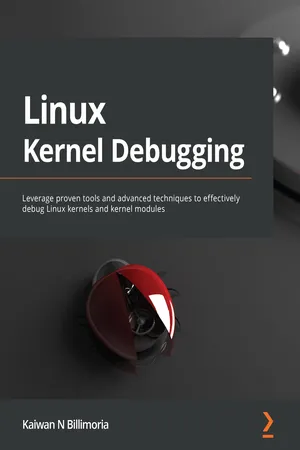
- 638 pages
- English
- ePUB (mobile friendly)
- Available on iOS & Android
Linux Kernel Debugging
About this book
Effectively debug kernel modules, device drivers, and the kernel itself by gaining a solid understanding of powerful open source tools and advanced kernel debugging techniques
Key Features
- Fully understand how to use a variety of kernel and module debugging tools and techniques using examples
- Learn to expertly interpret a kernel Oops and identify underlying defect(s)
- Use easy-to-look up tables and clear explanations of kernel-level defects to make this complex topic easy
Book Description
The Linux kernel is at the very core of arguably the world's best production-quality OS. Debugging it, though, can be a complex endeavor.Linux Kernel Debugging is a comprehensive guide to learning all about advanced kernel debugging. This book covers many areas in-depth, such as instrumentation-based debugging techniques (printk and the dynamic debug framework), and shows you how to use Kprobes. Memory-related bugs tend to be a nightmare – two chapters are packed with tools and techniques devoted to debugging them. When the kernel gifts you an Oops, how exactly do you interpret it to be able to debug the underlying issue? We've got you covered. Concurrency tends to be an inherently complex topic, so a chapter on lock debugging will help you to learn precisely what data races are, including using KCSAN to detect them. Some thorny issues, both debug- and performance-wise, require detailed kernel-level tracing; you'll learn to wield the impressive power of Ftrace and its frontends. You'll also discover how to handle kernel lockups, hangs, and the dreaded kernel panic, as well as leverage the venerable GDB tool within the kernel (KGDB), along with much more.By the end of this book, you will have at your disposal a wide range of powerful kernel debugging tools and techniques, along with a keen sense of when to use which.
What you will learn
- Explore instrumentation-based printk along with the powerful dynamic debug framework
- Use static and dynamic Kprobes to trap into kernel/module functions
- Catch kernel memory defects with KASAN, UBSAN, SLUB debug, and kmemleak
- Interpret an Oops in depth and precisely identify it s source location
- Understand data races and use KCSAN to catch evasive concurrency defects
- Leverage Ftrace and trace-cmd to trace the kernel flow in great detail
- Write a custom kernel panic handler and detect kernel lockups and hangs
- Use KGDB to single-step and debug kernel/module source code
Who this book is for
This book is for Linux kernel developers, module/driver authors, and testers interested in debugging and enhancing their Linux systems at the level of the kernel. System administrators who want to understand and debug the internal infrastructure of their Linux kernels will also find this book useful. A good grasp on C programming and the Linux command line is necessary. Some experience with kernel (module) development will help you follow along.
]]>
Tools to learn more effectively

Saving Books

Keyword Search

Annotating Text

Listen to it instead
Information
Table of contents
- Linux Kernel Debugging
- Contributors
- Preface
- Part 1: A General Introduction and Approaches to Kernel Debugging
- Chapter 1: A General Introduction to Debugging Software
- Chapter 2: Approaches to Kernel Debugging
- Part 2: Kernel and Driver Debugging Tools and Techniques
- Chapter 3: Debug via Instrumentation – printk and Friends
- Chapter 4: Debug via Instrumentation – Kprobes
- Chapter 5: Debugging Kernel Memory Issues – Part 1
- Chapter 6: Debugging Kernel Memory Issues – Part 2
- Chapter 7: Oops! Interpreting the Kernel Bug Diagnostic
- Chapter 8: Lock Debugging
- Part 3: Additional Kernel Debugging Tools and Techniques
- Chapter 9: Tracing the Kernel Flow
- Chapter 10: Kernel Panic, Lockups, and Hangs
- Chapter 11: Using Kernel GDB (KGDB)
- Chapter 12: A Few More Kernel Debugging Approaches
- Other Books You May Enjoy
Frequently asked questions
- Essential is ideal for learners and professionals who enjoy exploring a wide range of subjects. Access the Essential Library with 800,000+ trusted titles and best-sellers across business, personal growth, and the humanities. Includes unlimited reading time and Standard Read Aloud voice.
- Complete: Perfect for advanced learners and researchers needing full, unrestricted access. Unlock 1.4M+ books across hundreds of subjects, including academic and specialized titles. The Complete Plan also includes advanced features like Premium Read Aloud and Research Assistant.
Please note we cannot support devices running on iOS 13 and Android 7 or earlier. Learn more about using the app